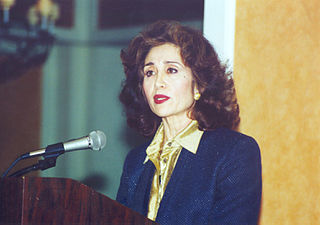
A refugee, according to the United Nations High Commissioner for Refugees (UNHCR), is a person "forced to flee their own country and seek safety in another country. They are unable to return to their own country because of feared persecution as a result of who they are, what they believe in or say, or because of armed conflict, violence or serious public disorder." Such a person may be called an asylum seeker until granted refugee status by a contracting state or by the UNHCR if they formally make a claim for asylum.

The United States Refugee Act of 1980 is an amendment to the earlier Immigration and Nationality Act of 1965 and the Migration and Refugee Assistance Act of 1962, and was created to provide a permanent and systematic procedure for the admission to the United States of refugees of special humanitarian concern to the U.S., and to provide comprehensive and uniform provisions for the effective resettlement and absorption of those refugees who are admitted. The act was completed on March 3, 1980, was signed by President Jimmy Carter on March 17, 1980, and became effective on April 1, 1980. This was the first comprehensive amendment of U.S. general immigration laws designed to face up to the realities of modern refugee situations by stating a clear-cut national policy and providing a flexible mechanism to meet the rapidly shifting developments of today's world policy. The main objectives of the act were to create a new, American definition of refugee based on the one created at the 1951 UN Convention and 1967 Protocol on the Status of Refugees; raise the limitation from 17,400 to 50,000 refugees admitted each fiscal year; provide emergency procedures for when that number exceeds 50,000; require annual consultation between Congress and the President on refugee admissions; and establish the Office of U.S. Coordinator for Refugee Affairs and the Office of Refugee Resettlement. Most importantly, it established explicit procedures on how to deal with refugees in the U.S. by creating a uniform and effective resettlement and absorption policy.

Mark Andrew Green is an American politician and diplomat. He is currently president and CEO of the Woodrow Wilson International Center for Scholars. Before joining the Wilson Center on March 15, 2021, he served as executive director of the McCain Institute for International Leadership, and prior to that, as the Administrator of the United States Agency for International Development. He served in the Wisconsin State Assembly from 1993 to 1999, was a Republican member of the United States House of Representatives from 1999 to 2007, representing Wisconsin's 8th congressional district, ran unsuccessfully for governor of Wisconsin in 2006, and held the post of United States Ambassador to Tanzania from August 2007 until January 2009. Green served as president of the International Republican Institute from 2014 to 2017 and sits on the board of directors of the Millennium Challenge Corporation.

Afghan refugees are citizens of Afghanistan who were forced to flee from their country as a result the continuous wars that the country has suffered since the Afghan-Soviet war, the Afghan civil war, the Afghanistan war (2001–2021) or either political or religious persecution. The 1978 Saur Revolution, followed by the 1979 Soviet invasion, marked the first major wave of internal displacement and international migration to neighboring Iran and Pakistan; smaller numbers also went to India or to countries of the former Soviet Union. Between 1979 and 1992, more than 20% of Afghanistan's population fled the country as refugees. Following the Soviet withdrawal in 1989, many returned to Afghanistan, however many Afghans were again forced to flee during the civil war in the 90s. Over 6 million Afghan refugees were residing in Iran and Pakistan by 2000. Most refugees returned to Afghanistan following the 2001 United States invasion and overthrow of the Taliban regime. Between 2002 and 2012, 5.7 million refugees returned to Afghanistan, increasing the country's population by 25%.

The United States recognizes the right of asylum for individuals seeking protections from persecution, as specified by international and federal law. People who seek protection while outside the U.S. are termed refugees, while people who seek protection from inside the U.S. are termed asylum seekers. Those who are granted asylum are termed asylees.
World Relief is a global Christian humanitarian organization whose mission is to boldly engage the world’s greatest crises in partnership with the church. The organization was founded in the aftermath of World War II to respond to the urgent humanitarian needs of war-torn Europe.

The International Catholic Migration Commission (ICMC) is an international organization that serves and protects uprooted people, including migrants, refugees, and internally displaced people, regardless of faith, race, ethnicity or nationality. With staff and programs in over 40 countries, ICMC advocates for sustainable solutions and rights-based policies directly and through a worldwide network of 132 member organizations.
VOLAG, sometimes spelled Volag or VolAg, is an abbreviation for "Voluntary Agency". This term refers to any of the nine U.S. private agencies and one state agency that have cooperative agreements with the State Department to provide reception and placement services for refugees arriving in the United States. These agencies use funding from the State Department's Bureau of Population, Refugees, and Migration (PRM) along with self-generated resources to provide refugees with a range of services including sponsorship, initial housing, food and clothing, orientation and counseling. VOLAGs may also contract with the Office of Refugee Resettlement to provide job placement, English language training and other social services. Each of the ten voluntary agencies recognized by the federal government vary significantly in their history, experience, size, denominational affiliation, philosophy, primary clientele, administrative structure, resettlement capacity, and institutionalized resettlement. Of the ten U.S. resettlement agencies, all of them are religiously affiliated or faith-based with the exception of the U.S. Committee for Refugees and Immigrants and the International Rescue Committee. The tenth VOLAG was added fairly recently in November 2022, when Bethany Christian Services (BCS) was officially designated as its own resettlement agency by the PRM.
The U.S. Committee for Refugees and Immigrants (USCRI) is a 501(c)(3) nonprofit organization with locations in the United States, Mexico, El Salvador, Honduras, and Kenya, and a national network of nearly 200 partner agencies that provide support for those experiencing forced and voluntary displacement.

The Indochina Migration and Refugee Assistance Act, passed on May 23, 1975, under President Gerald Ford, was a response to the Fall of Saigon and the end of the Vietnam War. Under this act, approximately 130,000 refugees from South Vietnam, Laos and Cambodia were allowed to enter the United States under a special status, and the act allotted special relocation aid and financial assistance.

Julia Ann Vadala Taft was a United States official who was involved in international humanitarian assistance, and who served as Director of the Office of Foreign Disaster Assistance from 1986 to 1989, and as Assistant Secretary of State for Population, Refugees, and Migration from 1997 to 2001.
Refugees of the Syrian revelation are citizens and permanent residents of Syria who fled the country in the course of the Syrian civil war. The pre-war population of the Syrian Arab Republic was estimated at 22 million (2017), including permanent residents. Of that number, the United Nations (UN) identified 13.5 million (2016) as displaced persons in need of humanitarian assistance. Since the start of the Syrian civil war in 2011 more than six million (2016) were internally displaced, and around five million (2016) crossed into other countries, seeking asylum or placement in Syrian refugee camps. It is believed to be one of the world's largest refugee crises.
The United States Refugee Admissions Program (USRAP) is an association of federal agencies and nonprofit organizations which work hand-in-hand to identify and admit qualified refugees for resettlement into the United States. Under Section 207 of the Immigration and Nationality Act of 1965, individuals wishing to settle in the United States are processed through this program.

Sima Wali was one of the foremost Afghan human rights advocates in the world, serving as an international campaigner for the liberties and empowerment of refugee and internally displaced populations. She was the Chief Executive Officer of Refugee Women in Development (RefWID), Inc., a global non-profit organization that advocated for the civil rights of refugee women and girls fleeing from conflict and for their equitable reintegration into their societies. She was also the vice president of the Sisterhood Is Global Institute, the world’s first feminist think tank.
Third country resettlement or refugee resettlement is, according to the UNHCR, one of three durable solutions for refugees who fled their home country. Resettled refugees have the right to reside long-term or permanently in the country of resettlement and may also have the right to become citizens of that country.

Alexander Betts is Professor of Forced Migration and International Affairs, William Golding Senior Fellow in Politics at Brasenose College, and Associate Head of the Social Sciences Division at the University of Oxford.

Dean Winslow is an American physician, academic, and retired United States Air Force colonel. He had been nominated by President Donald Trump to become the next Assistant Secretary of Defense for Health Affairs, but he withdrew his nomination in December 2017 after it was put on indefinite hold. He is Professor and former Vice Chair of Medicine at Stanford University. He previously served as Chair of the Department of Medicine and Chief of the Division of AIDS Medicine at the Santa Clara Valley Medical Center. In the Air Force, he deployed twice to Afghanistan and four times to Iraq as a flight surgeon supporting combat operations in Operation Enduring Freedom and Operation Iraqi Freedom.

Krishanti O'Mara Vignarajah is an American lawyer serving as President and CEO of Global Refuge. She previously served in the Obama White House as Policy Director for First Lady Michelle Obama and at the State Department as Senior Advisor under Secretary of State Hillary Clinton and Secretary of State John Kerry.
Climate migration is a subset of climate-related mobility that refers to movement driven by the impact of sudden or gradual climate-exacerbated disasters, such as "abnormally heavy rainfalls, prolonged droughts, desertification, environmental degradation, or sea-level rise and cyclones". Gradual shifts in the environment tend to impact more people than sudden disasters. The majority of climate migrants move internally within their own countries, though a smaller number of climate-displaced people also move across national borders.

Welcome.US is a nonprofit organization that coordinates the support of Afghan refugees in the United States.












